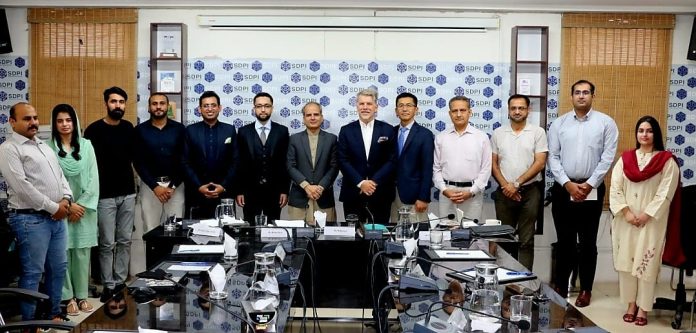By Hina Kiyani
ISLAMABAD: A high-level experts’ delegation from Kyrgyzstan on Monday visited Sustainable Development Policy Institute (SDPI) to explore avenues for enhanced collaboration between Central and South Asia, particularly in research, policy advocacy, trade, and connectivity.
Welcoming the delegation, Dr Sajid Amin Javed, Deputy Executive Director of SDPI, highlighted Pakistan’s renewed stance on strengthening ties with Central Asian Republics (CARs), in line with the vision of the Pakistan government, said a press release.
“Pakistan and Central Asia share deep historical and cultural roots,” he said, adding that “Our collective future depends on reviving those connections through research, policy dialogue, and sustainable cooperation.”
He added that SDPI is ranked among top 100 non-US think tanks globally by the University of Pennsylvania that continues to deepen its engagement across the region. “Central Asia is the least explored region, and SDPI aims to bridge that gap,” he said.
Dr Sajid briefed the delegation on SDPI’s core work areas of research, advocacy and outreach, and capacity building, and remarked that SDPI has over 100 active memorandums of understanding (MoUs) with national and international partners and regularly produces policy briefs, research papers, and working papers. The institute is also hosting Sustainable Development Conference (SDC) in November this year, which is Pakistan’s largest annual policy gathering for the past 28 years. This time the institute is set to organize the 16th South Asia Economic Summit and the UNESCAP Seventh SDGs Forum alongside the SDC.
Speaking on the occasion, Abdullah Dayo, Program Advisor, Friedrich-Ebert-Stiftung (FES) Pakistan mentioned the long-standing partnership between SDPI and FES, emphasizing their collaboration on “many cross-cutting policy issues.”
Prof. Dr. Emil Dzhuraev, political scientist and analyst in Kyrgyzstan lauded SDPI’s pioneering role in sustainability and public policy. “SDPI’s work predates the global sustainable development discourse by nearly a decade,” he remarked. Highlighting the potential of Central Asia–South Asia Trade Connectivity, he stressed that recent geopolitical shifts have opened new corridors for collaboration.
“The Central Asian Republics are increasingly engaging with Afghanistan and Pakistan to access seaports,” he said, adding that the region must overcome institutional inertia to build effective think-tank ecosystems.
Boburshoh Alimov, Project Officer, FES Uzbekistan, shared insights from Central Asia, noting that Uzbekistan and Kyrgyzstan are taking steps to strengthen ties with neighbouring states. “Uzbekistan, a double landlocked country, depends on Kyrgyzstan and Tajikistan for water. Water diplomacy and regional forums have therefore become essential,” he said. He pointed out that air pollution and climate challenges are shared concerns, and cities like Lahore, Bishkek, and Tashkent are ranked among the region’s most polluted ones. Tourism and youth cooperation, he suggested, could be promising areas for Pakistan – Central Asia engagement.
Philipp C. Jahn, Regional Director, FES Kyrgyzstan, Uzbekistan, and Kazakhstan, noted that the Ukraine-Russia conflict has reoriented supply chains and opened new logistical opportunities through Pakistan and Afghanistan. “We are seeing an 11% GDP increase in some Central Asian countries following this shift,” he said.
He added that Kyrgyzstan and China are strengthening trade ties, while regional priorities such as climate change, biodiversity, youth leadership, and women’s empowerment remain central to FES’s mission.
Uzma T. Haroon, Head of SDPI’s SDC Unit, invited the delegation to the upcoming four-day Sustainable Development Conference, co-hosted with Allama Iqbal Open University, which will also feature the third Sustainable Investment Expo.
Concluding the session, Dr Sajid Amin Javed thanked the delegation and announced SDPI’s plans to expand faculty exchange programmes and collaborative research between Pakistan and Central Asian institutions.




